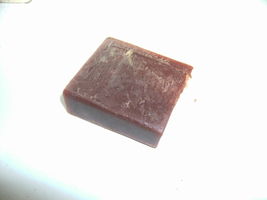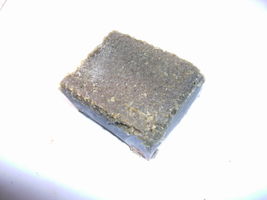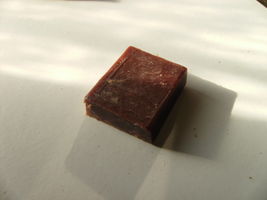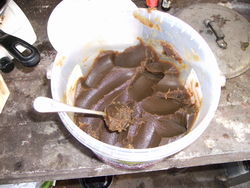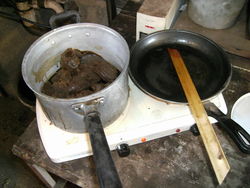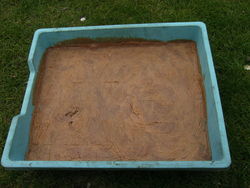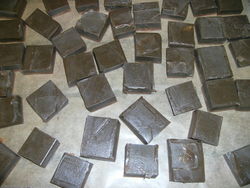Difference between revisions of "Making bar soap from glycerol"
(Minor rewording/refactoring to 3rd person) |
|||
| (21 intermediate revisions by 4 users not shown) | |||
| Line 1: | Line 1: | ||
| − | A quick guide to making bar soap | + | <metadesc>Biodiesel soap, Glycerol soap, Glycerine soap, Soap from Biodiesel bi-product, Making soap</metadesc> |
| + | <gallery caption="Variations on bar soap. Source: K.H" align="right" widths="300px" heights="200px" perrow="3"> | ||
| + | File:Lavenderandsoftsand.jpg|Lavender and soft sand. | ||
| + | File:Oatmealandessence.jpg|Oatmeal and fragrance. | ||
| + | File:Lavenderandredfooddye.jpg|Lavender and red food colouring. | ||
| + | </gallery> | ||
| + | |||
| + | A quick guide to making bar soap from glycerol. | ||
| + | |||
| + | Recipes courtesy of [[User:Chug|Chug]]. | ||
__TOC__ | __TOC__ | ||
| Line 5: | Line 14: | ||
==Ingredients== | ==Ingredients== | ||
| − | * 1 litre of demethed [[ | + | * 1 litre of demethed [[glycerol]] |
* Approx 80 ml of water | * Approx 80 ml of water | ||
* Approx 35 g of [[NaOH]] | * Approx 35 g of [[NaOH]] | ||
| − | You may have to play with these figures slightly to suit your | + | You may have to play with these figures slightly to suit your glycerol, so test batches are recommended! |
==Method== | ==Method== | ||
| + | [[File: Scoopingouttheglyc.jpg|250px|thumb|right|Scooping out set glycerol. Source: K.H]] | ||
| + | [[File: Heatingglycandcaustic.jpg |250px|thumb|right|Glycerol is heated with caustic. Source: K.H]] | ||
| + | [[File: Newlypouredsoap.jpg|250px|thumb|right|Hot, liquid soap poured into mould to set. Source: K.H]] | ||
| + | [[File: 7dayslatercutup.jpg|250px|thumb|right|After seven days, soap is turned out and cut to size. Source: K.H]] | ||
| − | * Heat the water to | + | * Heat the water to 50°C and add the NaOH. |
* Stir until dissolved (do not breathe the fumes). | * Stir until dissolved (do not breathe the fumes). | ||
| − | * Add this mix to the | + | * Add this mix to the glycerol and continue heating while stirring. |
* The mix will foam and froth then will start to thicken (now is the time to add any scents). | * The mix will foam and froth then will start to thicken (now is the time to add any scents). | ||
* Allow the mix to cool slightly. | * Allow the mix to cool slightly. | ||
* Pour the mix into your chosen mould and leave for 7 days to harden enough to be cut into squares. The soap will continue to harden over the next few weeks. | * Pour the mix into your chosen mould and leave for 7 days to harden enough to be cut into squares. The soap will continue to harden over the next few weeks. | ||
| − | You can add essential oils such as lavender to the mix to give a nice fragrance and you can also add chopped herbs to impart a scent | + | You can add essential oils such as lavender to the mix to give a nice fragrance and you can also add chopped herbs to impart a scent. |
| − | Adding silver sand to the mix makes a great exfoliating soap but you have to time the adding of | + | Adding silver sand, oatbran, bulger wheat etc to the mix makes a great exfoliating soap but you have to time the adding of it to perfection or it will sink to the bottom. |
==Moulds== | ==Moulds== | ||
| − | For moulds you can use anything that will take a small amount of heat such as margarine tubs and recycling box lids. If you get caught, muffin trays with the individual compartments are ideal! | + | For moulds you can use anything that will take a small amount of heat such as margarine tubs and recycling box lids. If you don't think you will get caught, muffin trays with the individual compartments are ideal! |
| − | ==Colouring and | + | ==Colouring and pH values== |
| − | This soap will be an uninspiring muddy brown colour but you can use small amounts of food colouring to alter it slightly. Don't overdo it or you will end up with a soap that stains your hands. | + | This soap will be an uninspiring muddy brown colour, but you can use small amounts of food colouring to alter it slightly. Don't overdo it or you will end up with a soap that stains your hands. |
| − | Chug also uses the soaps from his settling tank to give a lighter coloured soap than that made from | + | Chug also uses the soaps from his settling tank to give a lighter coloured soap than that made from glycerol. |
| − | The finished soap should have a | + | The finished soap should have a pH of between 9.5 – 10.5, which can be tested for with with pH indicator strips |
| + | but as it matures it may come down to around ph8. | ||
| + | Ive recently tried adding lemon juice and zest this being acidic it counteracts the caustic to give a milder soap of about pH7. | ||
| − | + | It may also sweat as it is hygroscopic - just wipe the moisture away. | |
==Liquid soap== | ==Liquid soap== | ||
| − | To make a liquid soap use KOH instead of NaOH. However, you must use the same catalyst that you used to make the | + | To make a liquid soap use KOH instead of NaOH. However, you must use the same catalyst that you used to make the glycerol. |
| − | This is | + | This is a recipe for liquid soap made with KOH: |
| − | * 1 litre of | + | * 1 litre of demethed glycerol |
| − | * | + | * 250ml water |
* 40g KOH | * 40g KOH | ||
| − | Add any essential oils before adding the water/KOH to the | + | Add any essential oils before adding the water/KOH to the glycerol. For less viscous liquid soap, add more than 250ml of water. |
==Warning== | ==Warning== | ||
| − | Do not use an | + | Do not use an aluminium saucepan for making soap as the NaOH will react with it. |
| − | If you intend on demething your | + | If you intend on demething your glycerol before making soap, make sure you are aware of the dangers of [[methanol]] vapour. |
| + | ==Further reading== | ||
| + | * http://en.wikipedia.org/wiki/Soap#Purification_and_finishing | ||
| + | * http://www.pioneerthinking.com/glycerin.html | ||
| − | See also | + | ==See also== |
| − | |||
| − | + | * [[MSDS - Glycerol ]] | |
| − | + | * [[MSDS - Potassium Hydroxide ]] | |
| + | * [[MSDS - Sodium Hydroxide ]] | ||
[[User:KH|KH]] 22:22, 5 December 2010 (UTC) | [[User:KH|KH]] 22:22, 5 December 2010 (UTC) | ||
| + | |||
[[Category:Biodiesel]] | [[Category:Biodiesel]] | ||
| + | [[Category:Miscellaneous]] | ||
Latest revision as of 13:25, 10 March 2013
- Variations on bar soap. Source: K.H
A quick guide to making bar soap from glycerol.
Recipes courtesy of Chug.
Contents
Ingredients
You may have to play with these figures slightly to suit your glycerol, so test batches are recommended!
Method
- Heat the water to 50°C and add the NaOH.
- Stir until dissolved (do not breathe the fumes).
- Add this mix to the glycerol and continue heating while stirring.
- The mix will foam and froth then will start to thicken (now is the time to add any scents).
- Allow the mix to cool slightly.
- Pour the mix into your chosen mould and leave for 7 days to harden enough to be cut into squares. The soap will continue to harden over the next few weeks.
You can add essential oils such as lavender to the mix to give a nice fragrance and you can also add chopped herbs to impart a scent.
Adding silver sand, oatbran, bulger wheat etc to the mix makes a great exfoliating soap but you have to time the adding of it to perfection or it will sink to the bottom.
Moulds
For moulds you can use anything that will take a small amount of heat such as margarine tubs and recycling box lids. If you don't think you will get caught, muffin trays with the individual compartments are ideal!
Colouring and pH values
This soap will be an uninspiring muddy brown colour, but you can use small amounts of food colouring to alter it slightly. Don't overdo it or you will end up with a soap that stains your hands.
Chug also uses the soaps from his settling tank to give a lighter coloured soap than that made from glycerol.
The finished soap should have a pH of between 9.5 – 10.5, which can be tested for with with pH indicator strips but as it matures it may come down to around ph8. Ive recently tried adding lemon juice and zest this being acidic it counteracts the caustic to give a milder soap of about pH7.
It may also sweat as it is hygroscopic - just wipe the moisture away.
Liquid soap
To make a liquid soap use KOH instead of NaOH. However, you must use the same catalyst that you used to make the glycerol.
This is a recipe for liquid soap made with KOH:
- 1 litre of demethed glycerol
- 250ml water
- 40g KOH
Add any essential oils before adding the water/KOH to the glycerol. For less viscous liquid soap, add more than 250ml of water.
Warning
Do not use an aluminium saucepan for making soap as the NaOH will react with it. If you intend on demething your glycerol before making soap, make sure you are aware of the dangers of methanol vapour.
Further reading
- http://en.wikipedia.org/wiki/Soap#Purification_and_finishing
- http://www.pioneerthinking.com/glycerin.html
See also
KH 22:22, 5 December 2010 (UTC)
